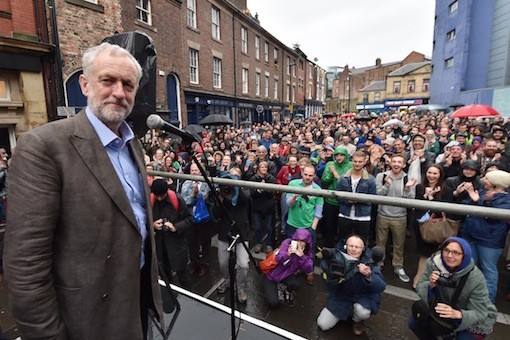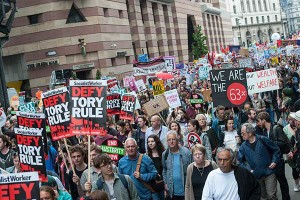
Labour leadership candidate Jeremy Corbyn speaks outside the Tyne Theatre and Opera House, Newcastle, during his campaign.
LAST WEEK Tony Blair professed bafflement at the rise — on both sides of the Atlantic — of popular movements by people who in Blair’s view choose to “rattle the cage”.
I think this is a mischaracterisation. Those who have been energised into supporting Sanders, Corbyn and movements such as Podemos and Syriza want to break the cage, ending the failed policies that continue to dominate and distort so much of our national discourse. What these movements represent is a desire and hope for something better. I don’t think that is baffling at all.
In two weeks the Budget will see another repeat of the regular farce of Chancellor George Osborne announcing old targets missed (again), new targets no-one expects to be met and earnings growth forecasts that will fail to materialise. There will be a series of promises in his speech that will make headlines and prove to be empty, claiming a “march of the makers,” that the economy will be rebalanced and there will be higher wages. The reality is that manufacturing output is significantly lower now than in 2008.
Jobs are being sucked into London, where employment is nearly 12 per cent higher than it was in 2010. In the rest of Britain and Northern Ireland it’s risen by just 0.3 per cent. Real wages continue to be worth £2,270 less than they were in 2008.
Osborne’s cuts have consistently failed, over and over again, to deliver for ordinary people in this country. And while Tory austerity is a particularly ghastly and brutal novelty, what it rests on sadly is not. For too long in this country the deep structural problems in our economy — manufacturing decline caused by a lack of investment, low productivity, geographical imbalances, the shackling of trade unions and resulting growth in insecure working and low pay — have survived successive governments. It has meant stagnating and falling wages, yawning inequality and an escalating housing crisis.
Osborne and David Cameron are content to retreat from tackling these problems, pursuing policies that continue to benefit the powerful and wealthy. This was inadvertently laid bare by his now infamous tweet claiming Google only paying mates’ rates on their tax obligations was a success. It is an outlook that allows powerful economic forces to sweep all aside, no matter what the human cost.
In contrast to this, Unite the union has been urgently calling on government to take a stake in the future of key industries such as steel, to save not just the jobs of thousands of steelworkers but their local communities, and a whole industry that can play a productive role in improving our infrastructure in the years ahead.
From 2008 the Tories and the politics of austerity sadly dominated the political scene — until last year. Growing numbers of ordinary people have been wracked by a feeling of insecurity about their future, about their children’s future. There’s been deepening pessimism and cynicism about the possibility of politics achieving change. That there is now a challenge to this, fuelled by the hope that things can be better, is an opportunity that should be grasped.
That health, homes, jobs and education are essentials we all should have and can be delivered if only there is the political will is at the heart of the upcoming People’s Assembly demonstration. Through the unglamorous day-in, day-out work of door knocking, leafleting, telephoning, high street stalls, organising and representing workers, we have seen a movement grow. This offers opposition to the Tories’ austerity agenda and has sown the seeds for the transformation in British politics, with the Labour Party becoming a party standing as an alternative to austerity.
Attention is now turning to how to deliver real change. In this, shadow chancellor John McDonnell has been creating an alternative discourse to austerity, arguing for investment in an economy that works for ordinary people.
He and his advisers have been meeting business representatives, noted economists and trade unions to develop new ideas about how to invest in our economy so that it delivers better living standards and security for all. McDonnell is also convening the New Economics series of public debates.
The Labour leadership has set itself the project of rethinking what the country as a whole should spend its money on, such as investment in building council homes for social rent rather than allowing large amounts to be consumed by private landlords as housing benefit. Then there’s how we as a country earn our money — we should be investing in economic growth and decent work rather than promoting speculative casino-style economics.
The Organisation for Economic Co-operation and Development and the International Monetary Fund are among the organisations losing faith with austerity and instead looking at greater public investment as the motor for economic growth. This is why we need a Labour government to deliver on the ideas and vision of how we can all be better off — not just the 1 per cent.
Investment in housing, public transport and communications technology can be the source of decent work (with collective bargaining) and provide the resources to fund an even better, publicly owned NHS with a workforce respected and rewarded rather than bullied — as we have seen with the junior doctors. It is a vision that the trade union movement embraces wholeheartedly and I am looking forward to chairing a pre-budget event with John McDonnell where we will be discussing some of these issues.
Labour is being bold, developing detailed new thinking in the full glare of an unremittingly hostile media and against the backdrop of upcoming local elections where a fed-up electorate will doubtless deliver its verdict on cuts. The conditions in Scotland and Wales are challenging too. Then there are the London mayoral and Assembly votes in my home city. A Labour mayor in Sadiq Khan would make a positive difference to the lives of millions of people and help pave the way for a Labour government.
None of this will be easy and there will undoubtedly be hiccups and challenges along the way, but that does not change the end goal that a Labour government will transform our society.
Having seen both the desolation that bad employers and insecure work can cause, I say the growth of movements for real change is not baffling — it is a long time coming.
- Steve Turner is assistant general secretary of Unite and co-chair of the People’s Assembly Against Austerity. He will be chairing the Labour Assembly Against Austerity event with John McDonnell on March 9, 7pm at the House of Commons.
- The People’s Assembly Against Austerity national march for Health, Homes, Jobs and Education is on April 16 and there is transport from across the country. You can find more details at thepeoplesassembly.org.uk
source

More Stories
Navalny’s death used to hide western failures in Ukraine and their support for Israel’s genocide
Gifts from Gaza
Vulture capital circles over the corpse of Ukraine…